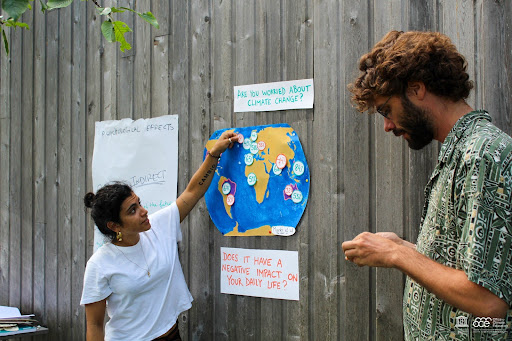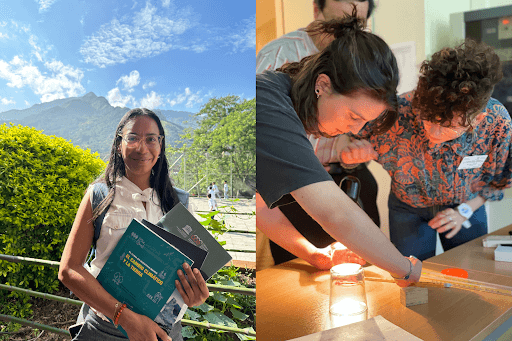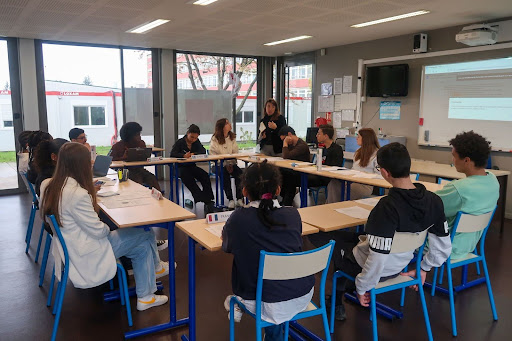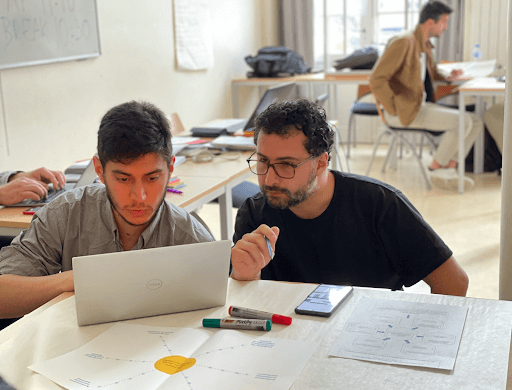Background
In the wake of the historic COP21, the Paris Agreement officially took effect in November 2016, placing a strong emphasis on education, training, and public awareness (as outlined in Article 12) in addressing climate change. Recognizing the need to equip younger generations with the knowledge and competencies necessary to navigate our rapidly evolving world, substantial endeavors have become imperative. Fueled by the aspirations and mobilization of youth, climate literacy is the most potent, transformative action in response to climate change. Responding to this challenge, a coalition of scientific and educational institutions came together in September 2017 to establish the Office for Climate Education (OCE).

The OCE envisions a world where all school teachers are equipped with the tools and knowledge to provide upcoming generations with a strong foundation in climate change understanding as well as the skills to act as global citizens in a changing world. Our mission is to empower primary and secondary school teachers to seamlessly integrate the concepts and issues related to climate change in the classroom and provide policy support to national education systems around the world. OCE encourages critical thinking, hopeful hearts, able hands, and empathy in an ever-evolving educational landscape.
Initiatives
The OCE is focusing on building bridges between the scientific and pedagogical communities in order to address climate change through the formal education system. As an IPCC Observer Organization, the OCE follows the report’s publication with specially adapted education resources for teachers that are free of charge, multilingual, and interdisciplinary. Moreover, the OCE actively puts forth professional development actions to build capacity in this crucial field and facilitates networks of practice worldwide. Further strengthening its role as category 2 center of UNESCO, the organization also supports public policies on climate change education and contributes to research and evaluation on the subject. As a pivotal co-coordinator in the newly established Greening Education Partnership, the OCE serves as a bridge between the global landscape of science and the specific needs of primary and secondary schools locally.

Leveraging its expertise in educational and project capacity building, the OCE takes the helm or actively participates in numerous implementation projects across various regions in France, in addition to other parts of Europe, and also on the global stage. For instance, the OCE coordinates a five-year, €4 million project called ALEC (América Latina para la Educación Climática), aimed at advancing climate change education in Latin America. To realize this mission, the OCE works in close collaboration with local partners to deploy educational actions on climate change in schools—based on professional development (PD) and support of teachers, the adaptation of pedagogical resources to the specific regional context, and the establishment of communities of practice. The overarching objective is to provide PD for a minimum of seven thousand teachers in the region, thereby equipping more than five hundred thousand students with a comprehensive and systemic understanding of climate change.
All our resources are adaptable to local contexts, making them a suitable fit for addressing climate change education within the unique context of California. Moreover, at the OCE, we are convinced that climate change education requires a multidisciplinary approach that encompasses subjects from both natural sciences (physics, chemistry, biology, geology, etc.) and social sciences (geography, economics, etc.). Indeed, the resources we produce include inquiry-based learning activities, such as investigation-based activities, project-based learning, role-playing games, debates, and more, many of these also being championed by the California education system. These turnkey educational tools are designed to not only promote informed action but also foster a positive mindset. Moreover, they consider the social dimensions that are inherently intertwined with the challenges of climate change adaptation and mitigation.

Teacher Partnership
Collaboration lies at the very core of OCE’s mission, and we hold a deep appreciation for working alongside teachers, community-based partners, and institutions at local and global levels. As we dedicate ourselves to advancing climate change education, we understand that the combined knowledge, expertise, and experiences of a diverse community of educators play a pivotal role in achieving our objectives. One shining example of our commitment to collaboration is our biennial International Seminar. This event provides an excellent opportunity for California teachers, as well as educators from all around the world, to integrate into a dynamic and interconnected community of practice. The seminar fosters the exchange of knowledge, the sharing of best practices, and the development of innovative teaching approaches.
I take great pride in the launch of the TeachersCOP, an international event created by the OCE to highlight to global politicians and decision makers the work of teachers, the challenges they face, and the key role they play in the global climate response. The first edition of TeachersCOP took place at COP26 in Glasgow and saw the participation of more than five hundred teachers from over thirty-five different countries. It was a significant step in recognizing the contributions of educators to climate education and action. The second edition of TeachersCOP during COP27 in Sharm El Sheikh was an even greater success, bringing together fifteen hundred teachers. This growth in participation demonstrates the growing need for support to teachers we see everyday on the ground, so I’m particularly proud of the decision to renew the TeachersCOP experience this year for COP28, which is currently taking place in the United Arab Emirates.

Collaboration
Science indicates that human impact on the planet’s climate is clear. Over the past thirty years, climate change has shifted from being primarily a scientific concern to emerging as one of the defining environmental challenges within our society. However, science alone cannot guide us on how to address this crisis. This challenge is also about how we envision living together, what we collectively value, and what level of risk we are prepared to assume. It fundamentally pertains to the kind of society we aspire to, making education a pivotal component. As Stefania Giannini, assistant director-general for education at UNESCO, reminds us constantly, education is the most transformational climate adaptation action!
All school teachers would be climate ready to provide younger generations with a strong foundation in climate change understanding as well as competencies in life skills, humanities, global citizenship, climate justice, etc., providing them with the systemic perspective as encapsulated in the 17 Sustainable Development Goals, with peace among people and with our natural environment.
Ten Strands and the OCE share a common goal: high-quality, evidence-based education to promote achievement, health, and well-being for students. Adapting OCE resources and co-designing professional development for TK–12 teachers in California would be a great way to start our collaboration.

